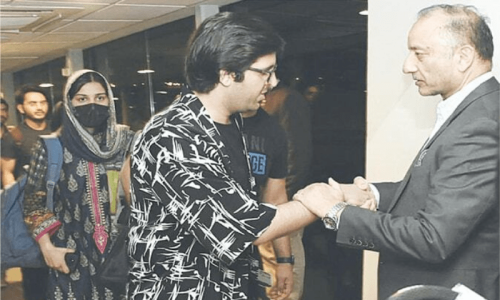ISLAMABAD, Dec 12: Pakistan on Monday said the resolution of the Kashmir issue was being discussed and underlined that it required flexibility which it was willing to show.
“We are discussing this (Kashmir) issue and are doing it with all sincerity, and we have stated that for resolving the issue flexibility will be required,” Foreign Office Spokesperson Tasnim Aslam said while responding to questions at a weekly news briefing here.
Making it clear that there would be no unilateral flexibility on the issue, she added: “We are prepared to do that and we hope that India will also show flexibility.”
Replying to a question, the spokesperson said progress in the composite dialogue could not be measured in months, emphasizing that it was a ‘process’ that needed time. She observed that the process would make incremental progress provided there was sincerity, commitment and flexibility on both sides.
She told a questioner that APHC leader Mirwaiz Umar Farooq during his meeting with President Gen Pervez Musharraf in Makkah had confirmed that he would be leading a delegation to Azad Kashmir and that he had already applied for visa.
Ms Aslam told a questioner that the visit by a six-member delegation led by Mr Katwari of the Kashmir Study Group (KSG) was in connection with earthquake relief. “They are here with relief assistance and these people are part of an NGO called Refugee International,” the spokesperson said.
In reply to a question, she said after the initiation of the Lahore-Amritsar bus service there were no plans of opening visa offices in the two cities.
Ms Aslam said the high commissions of the two countries were there to do the job, and added that by January 2006 the two consulates (in Mumbai and Karachi) would hopefully become functional.
On the Kishanganga issue, the spokesperson said that at the moment the relevant authorities in Pakistan were considering the options available under the Indus Waters Treaty. They were appointment of a neutral expert and seeking arbitration.
OIC SUMMIT: Ms Aslam disagreed with the view that there was widespread disappointment at the outcome of the OIC Summit given that it failed to demand withdrawal of foreign troops from Iraq and Afghanistan.
She termed the summit “a great success” and pointed to the 10-year ‘Programme of Action’ to which the Muslim countries had committed themselves to demonstrate solidarity.
She particularly referred to the section that talked about solidarity if any country was under threat or experienced difficulty.
When asked why was there no reference to democracy and strengthening of democratic institutions in the three documents adopted by the OIC-member states, Ms Aslam pointed to the specific mention of human rights and good governance and asserted: “Good governance covers everything.”
On the next follow-up steps to the 10-year action plan, she said that the document required many subsequent measures by the OIC-member states for implementation of the areas covered. They included joint solidarity and action; propagation of Islam as a religion of moderation and tolerance; and encouraging inter-religion dialogue.
She pointed out that in the economic field the summit had mandated a Commission for Economic Cooperation to expand the scope of intra-OIC trade and considered the possibility of free-trade zone among the OIC countries.
The summit agreed to facilitate visa for businessmen for trade within the OIC countries, Ms Aslam said while identifying the areas incorporated in the final document.
IRAQ: Responding to a question about the OIC summit not addressing the Iraq issue Ms Aslam said: “The Iraqi prime minister was there and the approach is to extend support to the extent possible so that people of Iraq are able to take full charge of their destiny. That the government there is able to stabilize the situation so foreign troops can withdraw and Iraqi people have control over their natural resources.”
Reminding a questioner that Pakistan was not in favour of the US military action in Iraq, Ms Aslam stressed that there was need to look ahead and see what could be done to ensure a peaceful and stable Iraq to strengthen the Iraqi government representing the people of Iraq. “We hope that with parliamentary elections that process would be strengthened,” she added.













































Dear visitor, the comments section is undergoing an overhaul and will return soon.